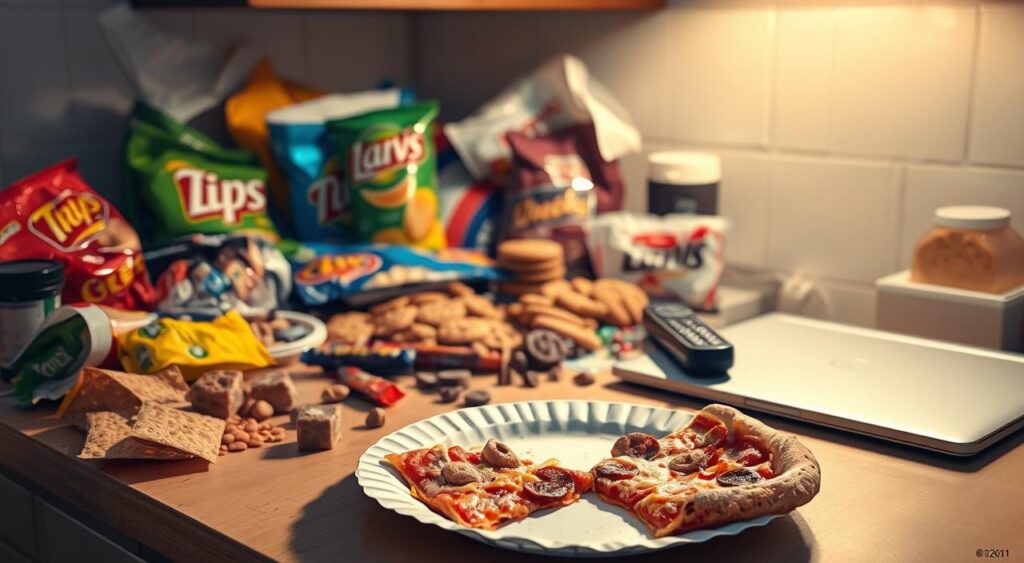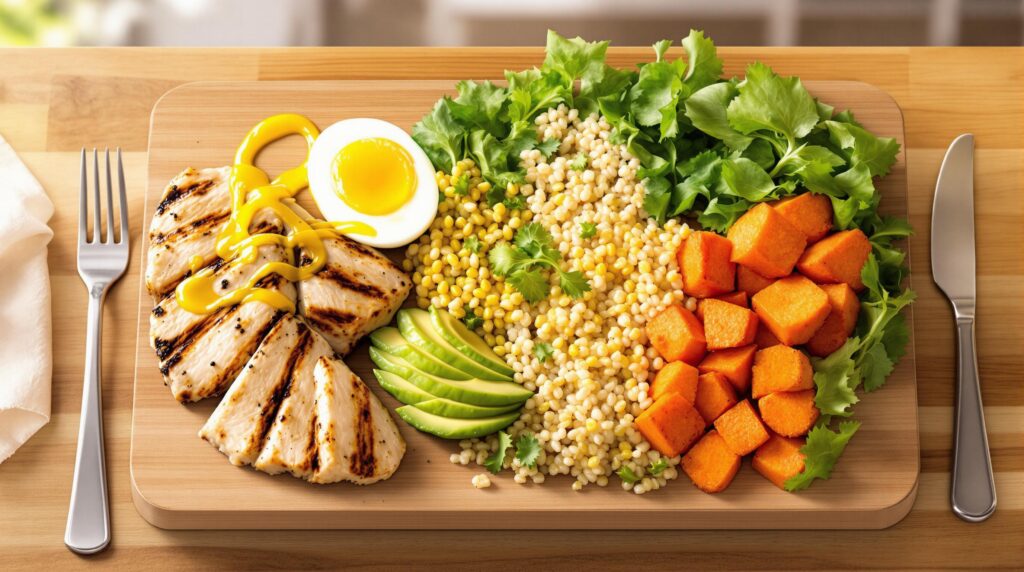Have you ever wondered why you eat more on weekends? It’s like all your careful eating goes out the window on Friday nights.
This guide offers simple, lasting ways to stop weekend overeating without feeling guilty. It’s about eating more or choosing less healthy foods on weekends. This is different from binge eating disorder, which is a serious issue needing professional help.
Many people follow a pattern: strict eating during the week, then overeating on weekends, feeling guilty, and then being stricter again. This cycle is called the restrict-binge pattern. It can be broken by making small, gentle choices, not strict rules.
In this article, you’ll learn how to stop weekend overeating. We’ll cover planning, mindful eating, and making balanced meals. We’ll also talk about staying hydrated, managing stress, and finding support. Remember, one bad day won’t undo all your hard work. Focus on making small, kind changes to build healthy habits.
Understanding Weekend Overeating

Weekends often feel like a chance to relax and enjoy treats. This can lead to overeating. Knowing what triggers this can help you make better choices.
What Triggers Weekend Overeating?
Mental restriction is a big trigger. If you’re strict during the week, you might binge on weekends. Research shows strict diets can make cravings worse.
Physical factors also play a role. Skipping meals or eating very little can make you hungry. Foods that quickly raise blood sugar can also make you hungry.
Seeing tempting foods at home can also lead to overeating. Emotional states like boredom and stress can make you want to eat for comfort. Alcohol at social events can make you eat more.
The Role of Social Events in Eating Habits
Social settings can influence how much you eat. At buffets and parties, you might eat more than you planned. Seeing others eat large portions can make you do the same.
Weekend gatherings offer many food temptations. Buffets and parties have lots of food to try. Alcohol can make you want to eat more.
To avoid overeating on weekends, start by being aware. Notice what makes you want to eat more. Plan small strategies like eating a snack before an event or choosing one favorite treat. These tips can help you enjoy social events without overeating.
The Psychology Behind Overeating

Why do you grab extra snacks on weekends? It’s about feeling versus hunger. Emotional eating is a way to cope with boredom, loneliness, stress, or to celebrate. True hunger grows slowly and accepts many foods.
Markers to tell them apart:
Emotional eating comes on fast and is linked to mood. You might crave specific foods like ice cream or pizza. Physical hunger, on the other hand, grows over time and can be satisfied with a variety of foods.
Practicing mindful eating on weekends helps you notice these differences. Take a moment before eating to check if you’re hungry or just feeling down.
Cortisol, the stress hormone, affects your appetite. High levels can make you crave more calorie-rich foods. This explains why stress can lead to overeating and weight gain on weekends.
Feeling ashamed after overeating can make things worse. This shame can lead to more bingeing. Being kind to yourself can stop this cycle. Treat yourself with the same kindness you would offer a friend.
Small steps can help you break the cycle. Check your feelings before eating. Try a short walk, deep breathing, or listening to music when cravings strike. Avoid calling foods “good” or “bad.” This can help reduce emotional eating.
Assessing Your Weekend Eating Patterns
Start by looking closely at how you eat on weekends. A simple check-in can help you spot habits that lead to overeating. Use short entries to make tracking quick and easy.

Keeping a food diary is a practical step. Write down what you ate, how much, when, and how hungry you were. Also, note your mood before and after eating, who you were with, and where you ate. This helps you see patterns and triggers.
Keeping a Food Diary
Choose a method that fits your life. You can use a paper notebook, the Notes app, or a dedicated app. What’s important is being consistent, not perfect.
Track your eating over several weekends to see changes. Look for patterns like late-night snacking after movies or bigger portions at brunch. Studies show self-monitoring helps with behavior change and weight control.
Identifying Overeating Triggers
Use your diary to find out what triggers binge eating. Look for common items and situations, like eating while watching TV or having high-GI breakfasts.
Try small changes to get clearer insights. For example, eat a high-protein, high-fiber breakfast one weekend and a balanced meal the next. See if eating at set times helps avoid late-night snacks.
Below is a quick comparison table to help you test common changes and observe results.
| Change to Try | What to Track | Expected Effect |
|---|---|---|
| Higher-protein breakfast | Hunger level midday, snacks eaten, energy | Fewer cravings, smaller afternoon snacks |
| Set meal times on Saturday | Meal times, portion sizes, late-night intake | Less random grazing, clearer appetite cues |
| Avoid alcohol at one meal | Calories consumed after dinner, choices at dessert | Reduced impulsive eating and larger portions |
| Swap high-GI breakfast for whole grains | Blood-sugar-related hunger, snack timing | More stable energy, delayed cravings |
Pair these experiments with weekend meal planning to shape better habits. Tracking will help you identify triggers for binge eating and guide adjustments that fit your lifestyle.
Setting Realistic Food Goals for Weekends
Weekends are for rest and fun, not strict rules. Set 1–2 clear, measurable goals you can keep. Aim for balanced meals and small wins to avoid overeating without feeling left out.

Use the plate method: half veggies, a quarter lean protein, a quarter whole grains. Try smaller plates to help with portion control. Pre-portion snacks into single servings instead of eating from the bag. Measure portions at first to train your eye, then rely on those visual cues.
Avoid eating straight from containers. This habit hides how much you eat and makes it hard to control portions. When you serve yourself, you stay aware and in charge.
Mindful eating practices
Eat without screens and take small bites. Chew thoroughly and pause mid-meal to check your fullness—satiety signals can take about 20 minutes to arrive. Savor flavors to increase satisfaction so you can enjoy less food.
Allow favorites in reasonable amounts. Flexible rules help you stay consistent with tips to avoid weekend overeating, without triggering deprivation-driven binges.
Combine these approaches with realistic targets. For example, fill half your plate with veggies at one weekend meal or limit dessert to one small portion. These simple habits make mindful eating on weekends and lasting portion control strategies easy to maintain.
Creating a Balanced Weekend Meal Plan
Planning your weekend meals helps you avoid making bad choices when you’re hungry. A simple plan for breakfasts, lunches, dinners, and snacks keeps you on track. It lets you enjoy healthy eating without feeling trapped.
Start with basic rules for your meals. Make sure to include protein like eggs, Greek yogurt, lean chicken, or beans to keep hunger away. Add fiber from oats, veggies, and fruit to slow down digestion. Healthy fats like avocado, nuts, or olive oil also help you feel full.
Choose carbs that keep your blood sugar steady and reduce cravings. Whole grains like oats, brown rice, and whole-wheat pasta give you steady energy. They help prevent sudden hunger spikes, teaching you to stop overeating on weekends.
How to Include Your Favorites (Guilt-Free)
Make room for your favorite treats in your plan. Instead of banning them, plan for one dessert portion a day or share a rich dish at a party. Pre-portion these treats into small containers so you can enjoy them without overdoing it.
Start meals with a large salad or broth-based soup. This approach increases fullness quickly, leaving less room for excess. It teaches you how to stop overeating on weekends in practice.
Filling Your Plate with Nutrient-Dense Foods
Batch-cook proteins and whole grains on Friday or Saturday. Make a grocery list that matches your plan. Portion leftovers into single-serving containers for easy grab-and-go options that support healthy weekend eating habits.
Balance each plate: half vegetables, one quarter lean protein, one quarter whole grains, and a small serving of healthy fat. This layout helps you feel satisfied and keeps calorie-dense foods in check during weekend meal planning.
| Meal | Example Foods | Why It Works |
|---|---|---|
| Breakfast | Greek yogurt, oats, berries, walnuts | Protein plus fiber and healthy fat keeps you full until lunch |
| Lunch | Grilled chicken salad with quinoa and olive oil | High volume and nutrients with steady carbs to curb cravings |
| Snack | Apple slices with almond butter or hummus and carrots | Fiber and protein-rich fat slow hunger between meals |
| Dinner | Baked salmon, brown rice, roasted vegetables | Balanced macronutrients support recovery and stable blood sugar |
| Small Treat | One square of dark chocolate or a scoop of gelato shared | Planned indulgence prevents uncontrolled overeating |
Smart Snacking Choices
Snacks can help you avoid overeating on weekends if you choose them wisely. Making smart choices can curb hunger and make meals easier to handle. Enjoy treats without feeling guilty by planning small, balanced snacks that keep you satisfied.
Healthy Snack Ideas for Weekends
Opt for snacks that mix protein with fiber or healthy fats. This combo slows digestion and reduces hunger. Try apple slices with peanut butter, Greek yogurt with berries, or hummus with carrot sticks.
Pair snacks like whole-grain crackers with cheese or carrots with hummus. These pairings balance taste and fullness. They help you enjoy variety while staying on track with your goals.
Preparing Snacks in Advance
Prepare snacks before the weekend to set yourself up for success. Portion nuts into 1-ounce bags and pre-slice fruits and vegetables. Assemble small snack boxes for outings.
Store single-serving leftovers in clear containers for quick access. This way, you can grab a sensible portion fast. Out of sight is out of mind when it comes to triggers. Keep indulgent treats in smaller containers or behind pantry items to avoid mindless munching.
Below is a simple comparison to help you plan snacks that satisfy hunger without piling on calories. Each option highlights what to pack, estimated prep time, and why it keeps you full.
| Snack | Portion | Prep Time | Why It Works |
|---|---|---|---|
| Apple slices + peanut butter | 1 medium apple + 2 tbsp peanut butter | 5 minutes | Fiber from apple and healthy fat + protein from peanut butter keep blood sugar steady. |
| Greek yogurt + berries | 6 oz plain Greek yogurt + 1/3 cup berries | 2 minutes | High protein and antioxidants; creamy texture feels like a treat. |
| Hummus + veggie sticks | 1/3 cup hummus + 1 cup mixed veggies | 10 minutes (if prepped) | Plant protein and fiber provide lasting fullness and crunch satisfaction. |
| Mixed nuts (portion-controlled) | 1 oz (about a small handful) | 0–2 minutes | Healthy fats and protein make nuts a compact, nutrient-dense option. |
| Air-popped popcorn | 3 cups | 3 minutes | Low-calorie volume snack with satisfying crunch; pair with a protein for balance. |
| Edamame | 1 cup shelled | 5–8 minutes | High in plant protein and fiber, keeps you full between meals. |
| Hard-boiled eggs | 2 eggs | 10–12 minutes (boil) or prep ahead | Portable protein that stabilizes appetite and pairs well with veggies. |
Staying Hydrated
Keeping your fluids up is a simple way to avoid weekend overeating. Drinking water helps you feel full and prevents mistaking thirst for hunger. It also lowers the urge to snack after a meal.
The Importance of Water
Drink a cup (about 8 oz) after a big meal to ease digestion. Carry a reusable bottle to drink water all day. Drinking regularly helps avoid mindless snacking that can lead to overeating.
Replace sugary drinks with water to cut down on empty calories. Also, drink alcohol in moderation. It can increase appetite and lower restraint at social events.
Infused Water Recipes to Enhance Flavor
Make water more exciting with infused water recipes. Try cucumber + mint, lemon + ginger, or strawberry + basil. Prepare pitchers in advance for a tasty, low-calorie drink option.
Limit fizzy drinks after a heavy meal if you feel bloated. Opt for plain water or a chilled pitcher of infused water instead. It refreshes you without adding calories.
Make it a habit to sip water all day, not just when you’re thirsty. This small change keeps you hydrated and supports your weekend goals without feeling deprived.
Engaging in Physical Activity
Staying active on weekends helps you enjoy meals without overeating. Try a short walk, a bike ride, or a game of pickleball. These activities can help control your appetite and boost your mood.
Fun Weekend Activities That Burn Calories
Choose activities you enjoy so you’ll stick with them. Hiking, dancing, paddleboarding, or playing soccer are great choices. They burn calories and keep you moving instead of sitting.
Short, frequent walks are better than one long walk. Try three 10–20 minute walks after meals. This habit helps keep your blood sugar steady and reduces the need to snack.
How Exercise Can Curb Cravings
Exercise changes your body’s hunger and stress hormones. It raises endorphins and balances ghrelin and leptin, making cravings less strong. Light to moderate activity after eating can also help with digestion and reduce the need for extra snacks.
Check out a study at Drexel University’s WELL Center on this topic. It shows that about an hour of activity can greatly reduce the risk of overeating. Even small amounts of activity offer benefits.
Make simple changes to your weekend routine. Swap an hour of TV for a bike ride or add a 20-minute walk after brunch. These changes help prevent overeating without feeling deprived.
Preparing for Social Gatherings
You can enjoy parties without ruining your weekend plans. A quick plan before you leave helps you avoid overeating. Use simple tactics that fit into your life so you can enjoy the event.
Try a small snack with protein and fiber an hour before you go. This can help curb hunger. Also, bringing a healthy dish shows you care and gives you a good option.
Tips for Buffets and Parties
Look at the food before you start eating. Choose a smaller plate to eat less.
- Start with vegetables and lean proteins to fill up on nutrients.
- Portion desserts consciously; take a small taste instead of a full serving.
- Avoid shuttling back with a full plate; wait and see if you truly want more.
- Limit alcohol to one or two drinks or choose lower-calorie options to reduce extra calories and lowered inhibitions.
These tips help you make better choices at events. You can enjoy the party without overeating.
Communicating Your Goals to Friends
Keep your message short and positive. Say something like, “I’m keeping it light tonight, I’ll enjoy small tastes.” This makes your goal seem like a choice, not a rule.
- Enlist a supportive friend to help you stay on track.
- Practice polite responses for offers of second helpings, such as, “It’s delicious, but I’m full for now.”
- Avoid long explanations to reduce pressure and questions.
When you talk about your eating goals to friends, do it clearly and kindly. This reduces awkwardness and builds support. You can then focus on enjoying the company, not just the food, while avoiding weekend overeating.
Finding Alternative Enjoyment
Weekends often lead to eating out of habit, boredom, or emotion. You can break this cycle by choosing new weekend activities that bring joy. Small changes can make a big difference in reducing emotional eating.
Begin with a simple change. Swap TV and snacks for a walk in a park or a photography stroll. Try pottery, join a game night, or help out in a community garden.
Exploring Non-Food Activities
Choose activities that keep your hands and mind busy. Painting, woodworking, or dancing can keep you engaged. Volunteering at a food bank or library adds purpose without focusing on food.
If learning interests you, take a one-time workshop. A cooking class can teach you about mindful eating. For tips on starting new habits, check out this guide: how to start.
Cultivating Hobbies That Distract from Eating
Turn snacking cues into new habits. When you feel like snacking, try herbal tea and reading, solve a puzzle, or do yoga. These changes help you break the cycle of automatic eating.
Make a plan for two activities each weekend and track your feelings and cravings. Gardening on Saturday and art on Sunday add variety. Over time, hobbies weaken emotional triggers and help you enjoy free time without food.
Practicing Mindfulness
Mindfulness helps you slow down and make calmer food choices on busy weekends. Use simple practices before and during meals to notice your hunger, savor flavors, and avoid automatic snacking. These steps fit into a weekend routine and pair well with planning and portion control.
Techniques for mindful eating
Turn off screens and sit at a table when you eat. Take small bites and chew slowly. Pause between bites to check your hunger and fullness. Describe flavors and textures in your head as you eat. These techniques for mindful eating shift you from autopilot to intention.
Try a two-minute breathing exercise before meals. Do a quick body-scan to notice whether you feel physical hunger or emotional urge. Use a hunger scale from 0–10 to decide if you should start or stop eating.
Benefits of meditation for reducing cravings
Short daily meditation sessions lower stress and improve self-control. Even five to ten minutes each day can help you notice urges without acting on them. Over time, meditation reduce cravings and cut down impulsive eating episodes.
Studies show mindful practices can reduce binge episodes and emotional eating. Combine these practices with a weekend meal plan to reinforce healthy patterns and reduce the chance of going off track.
Use mindfulness alongside portion control and simple food planning. This integrated approach makes mindful eating on weekends practical and sustainable for real life.
Creating a Support System
Having a strong support system helps you bounce back after setbacks. It makes your progress feel like a team effort. Look for people who listen without judging and support your healthy choices.
Sharing Your Goals with Loved Ones
Share your simple, specific goals with close friends or family. Explain what you need at gatherings, like a healthier dish. Practice saying short, honest phrases to ask for help without feeling awkward.
Start by sharing your goals with a few trusted friends. Let them know what success means to you and how they can help. This way, they can offer specific support instead of vague advice.
Joining Local or Online Groups
Find local meetups, Facebook groups, or forums on mindful eating and behavior change. Joining groups for binge eating support connects you with others who understand. They can share tips and empathy.
Also, consider professional help like registered dietitians, therapists, and evidence-based programs. If you think you might have binge eating disorder, get medical and mental health help.
Use apps for meal planning, tracking, and reminders. These tools, along with emotional support, help make lasting changes.
Celebrating Small Wins
Building healthy weekend eating habits takes time. Celebrate small steps to stay motivated and avoid shame.
Acknowledging Progress and Rewarding Yourself
Notice wins like choosing a planned meal or skipping seconds. Write them in a journal or app to track your progress. This shows that change is possible.
Give yourself credit weekly for actions you can repeat. Acknowledge the effort, not just the outcome. This helps you celebrate progress without expecting perfection.
Setting Up Non-Food Rewards
Pick rewards that feel meaningful and don’t involve eating. Try a massage, a new book, or a movie night. Small, frequent treats reinforce habits better than rare, big splurges.
Use short-term goals for weekly wins and longer-term goals for monthly milestones. For example, if you follow your plan three weekends in a month, reward yourself with a pottery class or new workout gear. Non-food rewards for overeating prevention signal that progress matters beyond the plate.
Below is a simple reward plan you can adapt. It links specific weekend behaviors to realistic, non-food rewards so you can maintain healthy weekend eating habits while you celebrate progress stop weekend overeating.
| Goal Timeline | Behavior to Track | Example Reward |
|---|---|---|
| Weekly | Choose planned meals both weekend days | Stream a new movie or buy an e-book |
| Weekly | Avoid second helpings at one meal | Take a long bath or a 30-minute walk in nature |
| Monthly | Use mindful eating techniques each weekend for four weeks | Schedule a massage or sign up for a hobby class |
| Monthly | Prepare healthy snacks ahead of weekend outings | Buy new workout gear or a fitness app subscription |
Accessing Resources for Further Support
If weekend binge eating is a problem for you, you’re not alone. Start with trusted sources to learn and grow. Books like “Intuitive Eating” by Evelyn Tribole and Elyse Resch can help you break free from diet mentality. “The Mindful Eating Workbook” by Vincci Tsui or Jan Chozen Bays offers step-by-step mindfulness practices.
For more information, check out the National Eating Disorders Association. They provide clear guidance on binge-eating disorder and local support options. These resources help you find reliable advice and professionals in your area.
Know when it’s time to seek help. If you binge frequently, feel intense shame, or binge at least once a week, it’s time to get professional help. Talk to your doctor about getting a referral to a registered dietitian or mental health professional.
Effective treatments include cognitive behavioral therapy, medication, nutrition counseling, and coordinated care. Combining self-help with professional support is key. Be patient, set realistic goals, and use resources and qualified clinicians to make progress. With consistent effort and compassion, you can overcome weekend overeating and build lasting habits.



